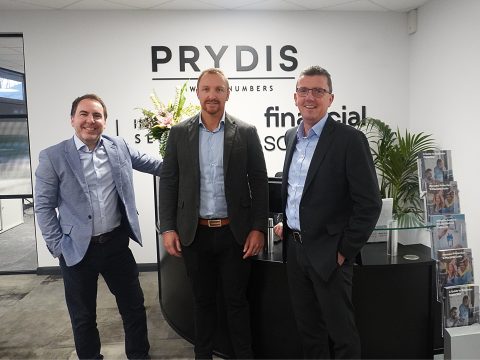
Last chance to buy at C G Fry & Son exclusive development in Axminster
16th May 2016
Exeter Wealth Management company donates unwanted stationery to charity’s E-shop
18th May 2016Cerebral Visual Impairment (CVI) was put under the spotlight at a special conference hosted by WESC Foundation (WESC), the Specialist Centre for Visual Impairment based in Exeter, Devon. Experts from around the UK, and as far away as the USA, came together to share their latest research findings and technological advancements to Special Educational Needs and healthcare professionals, parents and carers, local authorities and specialist schools and colleges.
Now in its seventh year, the day covered a range of topics including issues being faced by people with CVI, the education implications and how CVI affects learning.
There was much anticipation to hear keynote speaker Dr Gordon N Dutton, Paediatric Ophthalmologist & Emeritus Professor of Visual Science from Glasgow Caledonian University. Dr Dutton gave an inspiring and uplifting presentation about his experience with working with people who have disorders or damage to the brain and how, depending on the area of the brain affected, this correlates to what vision is lost.
Dr Dutton described a number of case studies from some of his patients who had damage to certain parts of the brain that stopped them from being able to see certain objects or recognise faces. He described the mystery of how a patient with injury to the ‘visual brain’ who appeared to be blind was somehow able to see patterns of movement such as water running down a plug hole or a girl’s pony tail flicking in the air as she ran without seeing the object itself. He followed on with another case study whereby one of his patients was blind due to CVI but could avoid objects and obstacles subconsciously due to perception pathways in the brain that were still intact after injury.
Dr Dutton’s stimulating and engaging two-hour presentation gave many insights into the complex world of neuroplasticity of the brain and its ability to re-wire itself, after brain damage, suggesting there is hope that the brain, potentially could create different visual pathways that could improve the lives of people with CVI.
Dr Amanda Lueck arrived from San Francisco to speak at the conference. She is a Professor Emerita in the Department of Special Education & Communicative Disorders at San Francisco State University.
Dr Lueck’s captivating presentation looked at how educational establishments should identify and cater for the needs of children with CVI. Dr Lueck advocated strategies which will enable children to participate as fully as possible with education and peer groups. Some of the topics she covered included how to identify and assess children with CVI and what sort of procedures need to be put in place in the classroom in order to give the best chance of learning. These included ensuring there are minimum distractions or visual clutter, minimum auditory distractions, optimal lighting, acoustics are maximised for understanding speech from more than one person at a time and simple room layout for ease of getting around. She suggested that all of these factors will help children with CVI be fully included in their education. She concluded that CVI in its milder form may not be discovered until the child attends primary school where more subtle difficulties are first noted.
Ophthalmologist and Consultant Senior Lecturer, Dr Cathy Williams, from the University of Bristol spoke at the conference for the first time. She opened her session by defining what CVI means, identifying what children are at risk, the functional impact on the child, and how to differentiate. She also highlighted how we can improve services for children with CVI with evidence, case studies and research projects, which can be presented to policy makers to help them prioritise effective measures.
Returning to the conference for the third year, WESC Foundation’s own Research Scientist Dr Jonathan Waddington, revealed the results of a study to design and develop a computer game aimed at assessing and improving functional vision for young people with CVI. Children with a visual field loss caused by CVI were able to improve their visual response time to find everyday objects scattered across a table top after training with the computer game called “Eyelander” for a few weeks. Dr Waddington is currently working with the University of Lincoln and other organisations to make the game freely available online.
Janet Harwood, Chair of Trustees, The Cerebral Visual Impairment Society concluded the conference by discussing the current issues being faced by children with CVI at present, including: a lack of joined up working practices in many areas, CVI not being understood by key people which help effect changes and no diagnoses, misdiagnoses or late diagnoses. Ms Harwood said: “The CVI Society’s role is to raise awareness of CVI and its impact by working with groups and agencies, offering practical support to people and their families, helping them to access the right services, providing emotional support and linking families together.”
There are an estimated 25,000 blind and partially sighted children in the UK needing specialist educational support (that’s one in every 500 children). Evidence suggests that CVI is the most common cause of visual impairment in these children. It is also estimated that the number of people living with sight loss in the UK is set to rise dramatically from 1.9 million in 2011 to 2.3 million in 2020, making research in this area increasingly important. This is why WESC Foundation is such an advocate for pushing the boundaries of research and development into vision impairment.
WESC Foundation provides education for over 80 visually impaired young people and is at the forefront of development in visual neuroscience technology. The services provided by WESC ensure every young person experiences the widest possible range of services in education, care, therapies and mobility as well as gaining greater independence.
For more information about the conference or to attend next year’s conference which will be held on 4th May 2017 please contact Katy Gaulton, Marketing, PR and Communications Officer, kgaulton@wescfoundation.ac.uk, 01392 454235.
See coverage on the Express & Echo



